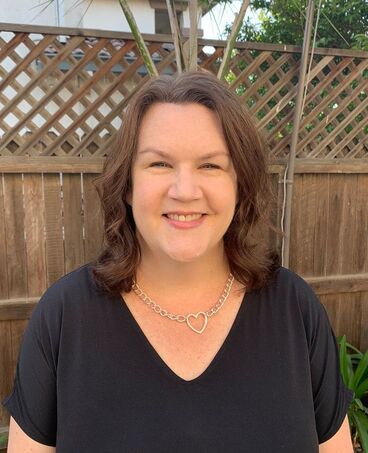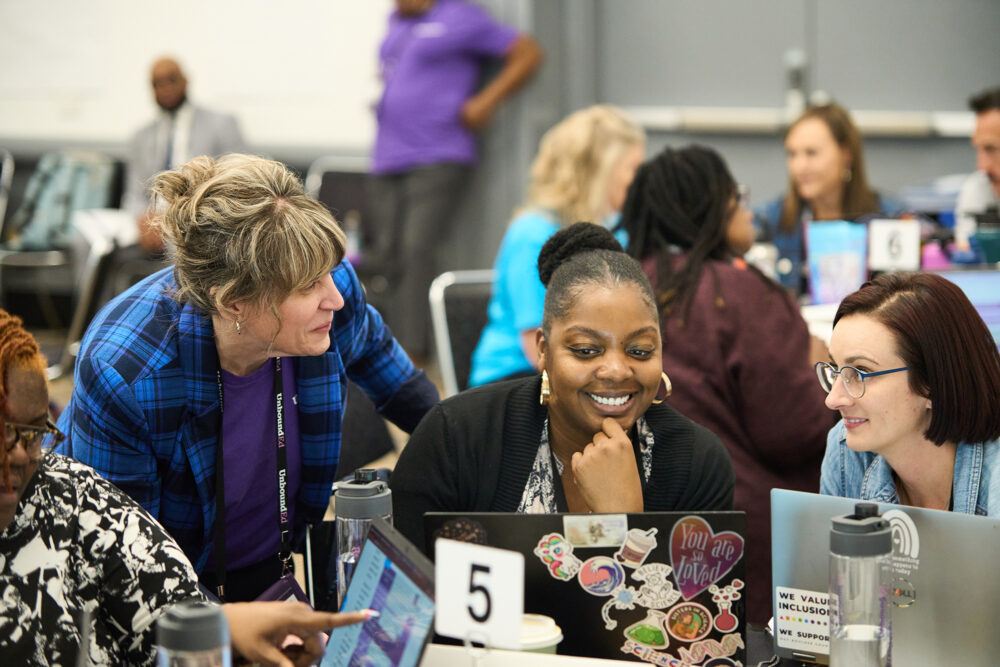Finally, Meet the Needs of Every Student
Today’s educators face a historic challenge. With engagement sliding, outcomes at risk, and students yearning for teaching that is affirming and meaningful, we need a fresh approach — one that feeds educators’ passion and fortifies instruction.
GLEAM Instruction is the most impactful strategy for breaking the predictability of historic achievement patterns so all kids thrive. At Standards Institute, courageous educators come together from across the country to forge a bold path toward truly transformative teaching and learning.
Our engaging, immersive pathways invite educators to experience, understand, and practice transformative instruction and leadership. Participants will reflect on current practice, commit to an action plan, and leave equipped and inspired to make every classroom GLEAM.

“Standards Institute makes me feel like there is hope. I know there are students we can be serving better; our whole school wants to improve outcomes for our students. But I didn’t know where to start or how to address all the needs. UnboundEd gave me the roadmap I needed to lead us forward.”
-Joni Hellstrom, Division Director, Venture Academy
What to Expect
At Standards Institute, educators will learn:
- Content-specific, grade-level standards deeply
- To maintain academic rigor by fostering productive struggle and scaffolding
- Strategies for ensuring affirming and meaningful teaching and learning
- How to plan, design, and deliver GLEAM Instruction
Educators will leave Standards Institute with:
- A shared understanding and language for fostering GLEAM Instruction
- The mindsets, planning, skills, tools, and actions to deliver GLEAM Instruction
- A personalized action plan with context-specific opportunities to ensure GLEAM Instruction
- A national community of GLEAM Instruction champions committed to growth and change
Register for Standards Institute 2026
Standards Institute™ Bay Area 2026 | June 8–11, 2026
Standards Institute™ New Orleans 2026 | June 15–18, 2026
Standards Institute™ Chicago 2026 | June 22–25, 2026
Standards Institute™ Philadelphia 2026 | July 20–23, 2026
Why Standards Institute is Different
Standards Institute is not a traditional conference or workshop but an immersive 30-hour in-person course-like experience, where educators from around the nation actively come together in content- and grade-specific cohorts to hone their craft and make their instructional practices grade-level, engaging, affirming, and meaningful — GLEAM.
Over four days, educators learn to unpack and understand standards, scaffold instruction, and foster productive struggle. Educators leave equipped to uphold academic rigor, make teaching and learning engaging and affirming, and improve outcomes for all students.
Together, we can end the predictability of student outcomes.
Start your GLEAM Journey at Standards Institute.

We had wonderful learning opportunities at previous Standards Institutes. Check out the highlights.
ExploreHow We Organize the Learning
UnboundEd Pathways
-
English Language Arts (ELA) Pathway
Standards Institute ELA sessions focus on the supports and scaffolds that work to address students’ unfinished ELA instruction while maintaining the rigor of grade-level standards and curriculum. Educators will:
- Explore the commitment, knowledge, and skills necessary to use ELA standards, texts, and tasks to provide all students access to GLEAM Instruction
- Leave with a personal action plan for bringing GLEAM Instruction to life in their ELA classrooms
-
Math Pathway
Standards Institute Math sessions offer participants an interactive, hands-on experience planning and implementing GLEAM mathematics instruction. Educators will:
- Reflect on math identities and their impact on GLEAM math instruction
- Deepen their understanding of math instructional shifts (focus, coherence, rigor) to support GLEAM math instruction
- Learn a new approach to address students’ unfinished instruction that supports GLEAM math instruction within their school contexts
- Adapt a task to align with the “meaningful” element of GLEAM math instruction
- Plan for and practice Math Language Routines (MLRs) to support GLEAM math instruction
-
Instructional Leadership Pathway
The Instructional Leadership Pathway gives school and district leaders a foundation in the key concepts of ELA and math instruction in order to develop a deeper understanding of both subject areas. Educators will:
- Consider key components of planning, instructional delivery, and coaching that lead to GLEAM Instruction
- Assess their roles as leaders in advancing effective instruction and operationalizing GLEAM within a school system
- Leave with a personal action plan to lead GLEAM Instruction in their schools
-
Organizational Leadership Pathway
In the Organizational Leadership Pathway, leaders grow their organizational leadership prowess and learn to create the conditions for effective instruction by reshaping the policies and systems they lead. Educators will:
- Explore their own leadership identities and approaches
- Examine barriers to effective instruction and develop a plan to better align time, people, and resources for educational impact
- Learn how to grow the collective efficacy and impact of educational leadership teams
- Leave with an instructional vision, an Action and Communications plan, and tools to help you drive sustainable, org-wide improvements that lead to effective instruction in every classroom
The iterative use of the tools will enable you to:
- Continuously assess and adjust your systems, structures, policies, and practices
- Make strategic decisions about time, people, and resources
Explore the Organizational Leadership Pathways’ Agenda
Pathway Role Bands: Principals and Assistant Principals K–5, Principals and Assistant Principals 6–12, District Leaders K–12
-
UnboundEd Planning Process™ (UPP®) Pathway
UnUnboundEd Planning Process™ (UPP) sessions introduce participants to a set of powerful practices for bringing grade-level, engaging, affirming, and meaningful — GLEAM — instruction to life in their own classrooms. Educators will:
- Explore the meaning and value of GLEAM Instruction for all learners
- Learn a step-by-step strategy for applying GLEAM principles to any lesson and gain hands-on practice
- Leave with a personal action plan for bringing GLEAM Instruction to life in their classrooms
Note: All participants are encouraged to bring a lesson from their own curriculum so they can apply new planning skills immediately in their lessons. Sample ELA and math lessons will be available for teachers who do not have access to a curriculum or their own materials.
Explore the UPP Pathways’ Agenda
Pathway Grade Bands: K–5, 6–12
CORE Learning Pathways
-
CORE Learning: Leadership for Literacy (L4L)
Leadership for Literacy was developed by and for school and district leaders. This training introduces school and district leaders, including directors, principals, assistant principals, and site-based leadership teams, to the science of reading and how to create the systems to support the implementation of Structured Literacy. Upon completion of this training, school leaders take processes and tools back to their school sites to support the development of a 90-day action plan aimed at jump-starting the shifts necessary to implement Science-of-Reading-aligned literacy instruction.
This training can be a stand-alone professional learning opportunity or an introductory session to set the stage for school leaders to dig deeper into leading literacy through CORE’s Reading Fundamentals Leader Institute or executive coaching.
Levels
- K-12
Audience
- School principals
- Assistant principals
- District leaders
- Site-based leadership teams in partnership with principals
-
CORE Learning: Adolescent Literacy Solutions (ALS)
Without a firm foundation in basic reading skills, many middle and high schools will struggle to meet the rigorous expectations of the state standards. This series equips educators with the knowledge and skills necessary to accelerate students’ learning pace. CORE’s Adolescent Vocabulary and Comprehension Strategies and Text Structure courses address the needs of all learners to access and excel in high-quality tier 1 instruction effectively. Our Multisyllabic Word Reading and Fluency Development courses provide an intensive intervention-focused solution for your teachers of adolescent readers who are still approaching proficiency.
Levels
- 6–12
Audience
- ELA, Reading, & content teachers
- Multilingual Learner teachers
- Special education teachers
- Intervention teachers
- Literacy coaches
Who is Standards Institute for?
Whether you’re a teacher, coach, principal, or district leader, there is a pathway for you.
Host A Local Standards Institute
If you’re interested in bringing the powerful learning of Standards Institute home to your district, please connect with our team to discuss hosting a local event.


I learned so much from the Standards Institute. Not only did I gain a deeper understanding of the standards myself, I also learned ways to support and coach teachers on ways to ensure effective instruction based on the standards.
Principal